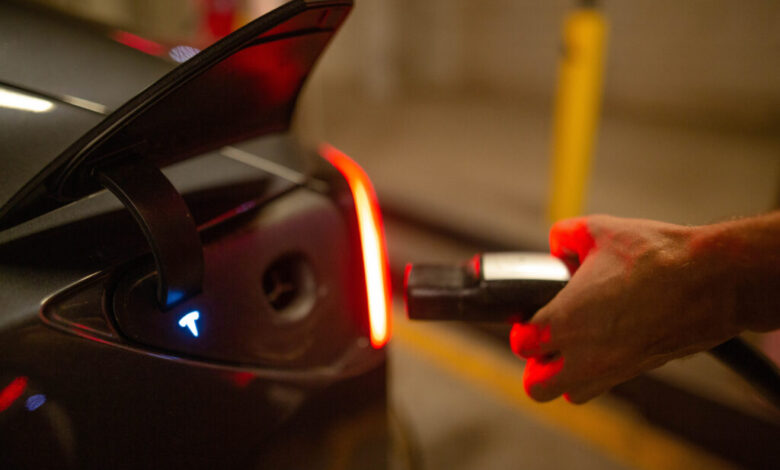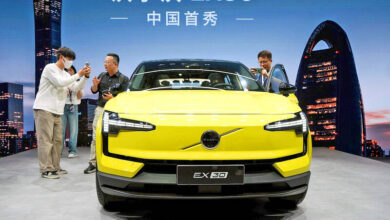Electric vehicle battery building is booming. But is there demand?

Automakers and other manufacturers are investing some $100 billion to build batteries for electric vehicles in the U.S. Here in Texas, Tesla already builds batteries for the cybertruck and other EV models.
30 battery plants are planned or under construction in the Midwest and the South. Their projects are taking off just as EV sales in the U.S. have faltered in recent months.
Journalist Micheline Maynard wrote about the EV battery boom for the Boston Globe. She publishes the newsletter, Intersection: Everything that Moves. Listen to the interview above or read the transcript below.
This transcript has been edited lightly for clarity:
Texas Standard: So EV battery plant construction is booming right now. Who’s building these plants and where?
Micheline Maynard: I am really surprised. So I wrote about this for the Boston Globe, and I came across a map that shows where these plants are being built. The main bulk of them is in a line that you draw from about the Detroit area all the way down to Texas, and then a number of them are being built on the East Coast of the United States and then up in Canada as well.
And of course, Tesla kind of predated all of this with its Gigafactory that was built in Reno, Nevada. It’s taken about 14 years for these EV battery plants to bubble up into this big economic development boom. Oh my goodness, they are on the way right now.
It’s so interesting because the U.S. seemed to be out of the manufacturing game for so many years. I’m curious why now? Is this all about federal incentives or are there some sensible business reasons these plants are being built in the U.S.?
There’s a couple things going on.
First of all, yes, there are business incentives from the Biden administration that came about last year, and that is spurring some of the recent announcements. But other announcements just have to do with the fact that states have figured out that these EV battery plants are going to create a lot of jobs, and they’re competing for them.
The best example of that is North Carolina, which has gotten a $14 billion investment from Toyota, which is going to be used to build batteries for hybrid cars, plug-in hybrids and EVs. And Toyota doesn’t have a lot of EVs yet, but they are converting many of their models over to hybrids. And so these American-built batteries will go into those hybrid vehicles starting very soon.
You point out in your article that when the UAW went on strike last year, battery plants were among the first casualties – companies looking to pare back their expenses. Has that attitude changed since the strike was settled?
Well, so one of the things the UAW wanted in the strike was a promise from the Detroit car companies that jobs with these EV battery plants would go to UAW members. The sticking point is that a lot of these battery plants are joint ventures, so the car company can’t speak for the joint venture partner.
They came up with sort of a compromise that said if they’re a battery venture from a car company that owns it, the jobs can go to the UAW. But the ones that are separate companies, it would still have to be negotiated.
The UAW sees this coming, and it’s watching this. Car companies cut jobs in traditional assembly plants and shift work over to these battery plants. And so they don’t want their workers to be left out in the cold, so to speak.
We were talking about sluggish EV sales a few moments ago. I’m wondering, is there a kind of tipping point that might force some of these companies with their big battery manufacturing plans to shift gears, maybe cancel altogether?
There’s one estimate by the Environmental Defense Fund that we already have capacity for 18 million vehicles. And the biggest estimate is of 10 million vehicles sold. And that’s way off. We were only at about 2.2 million electric vehicles last year. Now if you add in the hybrids, it goes up, but there’s more capacity already than there will be vehicles in demand for the next few years.
So I absolutely could see some of these projects getting cut, closed, not happen, that sort of thing. I mean, it’s not just the Detroit carmakers, it’s the international carmakers and it’s independent companies. They’re just saying, “I think I’ll build an easy battery plant and get in on this.”
Well, push is going to come to shove, I think, in this market.



